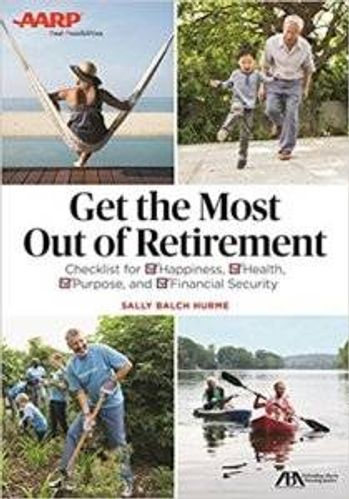How to Get the Most Out of Retirement
Advice from the author of a new book on the subject
Some people approaching retirement may be asking with trepidation: What’s it going to be like? Others slide into retirement with the view that they’ll take a couple of months to relax and then see what happens. Somewhere between trepidation and lethargy may be your sweet spot, as I explain in my new book, Get The Most Out of Retirement: Checklist for Happiness, Health, Purpose, and Financial Security.

The Best Thing About Retirement
The best thing about retirement, I have found, is that for the first time in my life I’m in charge of my time. From kindergarten through college, from that first to that last job, my time and tasks have been governed by others. Now that I’m a couple of years into retirement, I decide what I’ll do and when I’ll do it.

As liberating as this may sound, you still should be strategic in planning how you are going to spend the next couple of decades.
Think about all the changes you made between ages 20 and 40: You probably got married (once or twice), moved several times and saw your children grow from infants to young adults. You had some exciting vacations and moments of heartbreak when things didn’t work out as planned. Through those early years, you set goals, made plans, had to readjust and most likely changed your mind about where you were headed.
The years between ages 60 and 80 aren’t going to be that much different. You need goals, plans and the flexibility to adjust when circumstances change.
Setting Retirement Goals and Staying Flexible
Some of the key goals I set for myself: stay healthy, pursue my passions, be connected, keep talking, get organized and give back. Yours may be different. In planning for how you will spend your time, think strategically about how you want to spend each day. Choose to do fewer things you don’t like and more things that make your heart sing. Whenever you can, don’t say “Yes” when you want to say “No.”
Keep in mind that you don’t have to accomplish everything you set out to do in that first year of retirement. Think of retirement as an adventure when you can try new things, meet new people and have a different schedule. Deliberately taking small steps down multiple paths is a way to try out something that’s new to you.
It’s OK to take detours or explore byways that seem attractive as you transition through retirement. You can always come back to the familiar path if you want. Be flexible so you can adjust your sights when needed.
The 5 P's of Retirement
One of the biggest mistakes people make when approaching retirement is not taking a close look at all their options. Preconceived notions of what retirement looks like — whether that might be “it’s going to be boring” or “it’s a rest-of-my-life vacation” — are roadblocks to creativity.
The adventure called retirement is full of options regarding the 5 Ps: place, people, possibilities, purpose and passion.
Choosing Where to Live in Retirement
Retirement is one of those life events that many people use to think about whether they want to move. You might be considering relocating closer to your family (or farther away), to a senior community, to an age-in-place village, out to the mountains or near the water, away from the city or into an urban center, or just downsizing to a smaller home near where you now live. The options are limitless, but each takes planning to achieve and a reality check about what will meet the needs of everyone in your household.
In the case of my husband and me, the old stone farmhouse in the county was charming when we bought it as a retirement place 15 years ago, but as the house aged and needed more maintenance, the two of us aged and needed maintenance, too. It eventually became apparent that fixing up the farmhouse was too much work, too far from services and too distant from family. Plan B is working great: We are now living close to family and health services in a little house that’s easy to care for.
Planning Things Out With Your Spouse or Partner
Another mistake some retirees make is failing to share retirement expectations with those around them. Remember: What you do in retirement affects everyone in your family and social circle. Is your spouse or partner on board with your plans? How will what you want to do change his or her life? New schedules, lifestyles and finances come into play that can alter each partner’s roles and responsibilities.
My experience with expectations is probably typical. My husband was ready to retire 10 years before I was. I figured that was fine with me because I had a long “honey-do” list of things I wanted him to accomplish in his retirement. I put job slips in a bowl with the expectation that he would pick one out each morning and have it done by the time I came home. You can guess how that worked out!
To my husband, retirement meant not having to do what others wanted him to do on a fixed schedule. My expectations and his plans did not mesh.
When your priorities and your spouse or partner’s don’t mesh, negotiate. Compromise is a key way to avoid driving each other crazy. It’s also healthy for the relationship to make space in your days for “alone time” and “doing my own thing;” too much togetherness can be smothering.
Coming Up With a New Identity in Retirement
One of the biggest shocks about retirement is the loss of your work identity. Once that work paycheck stops, you have to come up with a new description of who you are. I’m still not sure what to say about who I am now. “Former employee” has no pizzazz. For me, “retired” says more about what I’m not doing, rather than who I am and what I am doing in my new life.
In planning for, and living in, retirement, take stock of who you are and who you want to be. Many identities won’t change: spouse, parent, grandparent, friend, volunteer, person of faith. But now’s the chance to add to that identity with the changes in your new lifestyle: student, gardener, chef, golfer, traveler, caregiver or whatever your passion is.
Preparing for Finances in Retirement
As for finances, I can tell you that switching from saving for retirement to spending in retirement was a big adjustment for me. Not getting a regular paycheck means adjusting to new ways of paying for everyday expenses. Commuting and other work-related expenses may be behind you, but health insurance costs may go up. So, before you retire, it’s strategic to have a clear idea of which expenses you’ll need to cover and the cash flow you’ll have coming in. In my book, I have tips and checklists that I found helpful getting organized at the start of my retirement. They sure cut down on sleepless nights.
Many people fear not having enough money for their desired retirement lifestyle. My advice: Pay down as much debt as possible before moving to a fixed retirement income. The more interest you accumulate on debt the more burdensome your debt becomes.
Working in Retirement: Not an Oxymoron
Going back to work part-time can be an option, too. Work in retirement is not an oxymoron. According to a 2013 Merrill Lynch retirement study, 71 percent of pre-retirees said they expect to work during their retirement years. Part-time employment, freelancing or consulting work may meet your needs.
I scanned a website that lists local part-time job opportunities and found dozens of positions for bookkeepers, receptionists, library assistants, chain store associates and after-school counselors. My favorite: wine hospitality specialist at a local vineyard. You may be surprised at the options where you’ll live.
The key to finding work you’ll enjoy in retirement seeking a fit between your gifts and interests and the world of opportunities out there. AARP has many books to help you find and get a job at the bookstore area of its website: AARP.org/bookstore.
Yogi Berra once said, “When you come to a fork in the road, take it.” Retirement is one of those forks in the road of your life. When you come to this point, you’ll want to be prepared for whatever path lies ahead.

